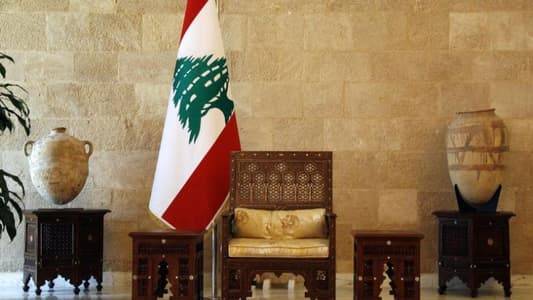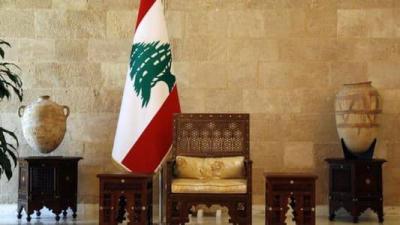The Lebanese Parliament remains unable to stop the countdown of unproductive sessions for the election of a president, which has become evident in the sessions held so far, including the eighth session scheduled for next Thursday. This session may be the last of the current year, which is nearing its end without indicating that the new year will bring any change to the troubled political scene, due to the interruption of communication among parliamentary blocs; they are seeking an agreement on a consensual president in the absence of an international push that could facilitate a new political reality, unlike the current chaotic and confused situation that hinders the election of a new president.
The holiday break will not allow the parliamentary blocs to reconsider their positions on obstructing the election sessions, as if the country were in its best state, with ample opportunity to play for time, especially for those who insist on voting with white papers, while a large number of MPs belonging to the Sunni community are struggling under the burden of being lost; they lack the ability to fill the vacuum due to the reluctance of Sunni references to participate in the elections, which has disrupted the balance in Parliament.
Despite the fact that parliamentary blocs belonging to the "resistance" axis are obstructing the internationalization of the presidential entitlement, the obstruction raises questions about the role of the international community in pressuring the parliamentary blocs to communicate as a condition for agreeing on a balanced settlement that would bring a consensual president. In this context, a prominent diplomatic source, who preferred to remain anonymous, stated that the obstructive actions by the resistance axis in election sessions would lead to intervention by the international community. Otherwise, how can they reconcile their insistence on nationalizing the presidential entitlement with their obstruction of the sessions, which might continue until "Hezbollah" convinces its ally, the head of the "Free Patriotic Movement," MP Gibran Bassil, to clear the presidential arena for the candidacy of former "Mardean" leader MP Sleiman Franjieh?
The same diplomatic source pointed out that the international community has not yet decided to take action to dismantle the political mines delaying the presidential election, nor can we say that it has begun its action only to be met with a dead end. It reveals that consultations between the United States, France, Egypt, and Saudi Arabia have not ceased, without entering into a preference for one candidate over another.
It confirms that there is no connection between the maritime border demarcation between Lebanon and Israel, facilitated by the U.S., and the election of a president, indicating to "Asharq Al-Awsat" that the demarcation reduced tension in the south, leading to a kind of calm, and thus does not reflect on the presidential election. The same source believes that some had hoped for a French role with Iran to achieve a presidential settlement under the pretext that communication between Paris and Tehran played a role in the success of the maritime demarcation, but their relationship soon encountered a setback due to the French position sympathetic to the protests in several Iranian cities.
It adds that the French position upset the Iranian leadership and led to the disruption of communication between the two countries, which drives Tehran to harden its stance against facilitating the election of a president unless the candidate aligns with the conditions of Hezbollah's Secretary-General Hassan Nasrallah, arguing that the resistance needs reassurance. However, the opposing political team, rather than the party, is the one that needs guarantees to maintain internal balance, especially given the ongoing use of surplus power, as is currently happening.
The same source states that the international community has not utilized its capabilities to expedite the election of a president, and currently positions itself on the waiting list. This situation may prolong unless the parliamentary blocs take initiative to exit their current stances and open channels for communication that are nearly nonexistent, while continuing the political exchange of blame among themselves.
The diplomatic source clarifies that previous election sessions have shown that the negative balance between the resistance axis and the opposition supporting MP Michel Moawad's candidacy remains dominant, as long as the MPs from the Sunni community outside traditional political alignments are positioned in between and act as a reserve block that could tip the scales for the name that will bear the title of President. This is in contrast to the changes that have started to emerge among the members of the "Change Forces" bloc, indicating a division between those supporting Moawad and those backing Dr. Issam Khalifa.
It emphasizes that Moawad's candidacy establishes a unification of the opposition by attracting deputies from the Change bloc to support him and describes him as the serious candidate thus far unless Franjieh clarifies his position. There is potential for support from Moawad's faction to search for a president from outside the resistance axis. It notes that aside from Moawad, the competition may ultimately be between two serious candidates: Franjieh and Army Chief General Joseph Aoun, against candidates currently standing on "line 29," referring to the maritime demarcation line that Lebanon conceded, who could fall victim to the burning of names, despite none of them officially announcing their candidacies for the presidency, along with candidates wishing to run but facing difficulty assuming the presidency, as is the case for Bassil.
Moreover, a prominent political source with standing in the opposition supporting Moawad states that there is currently no alternative to him, and retracting support in favor of another candidate is not on the table lest he suffer the fate of Moawad. Therefore, it is premature to skip stages before confirming the seriousness of the resistance in agreeing on a third candidate other than Franjieh. Consequently, the opposition will not sell Moawad's card for free, without a political price that transitions towards a new political era starting with a presidential candidate that could establish a new balance in the country.




